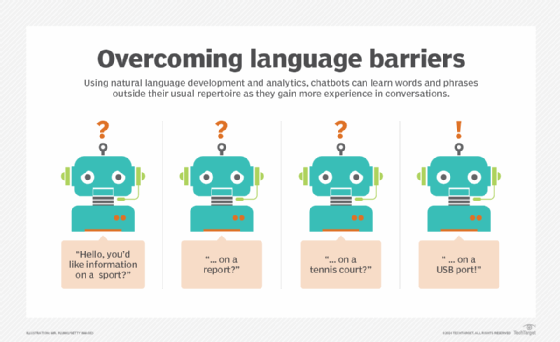
Getty Images/iStockphoto
Industries leading the way in conversational AI
Learn how companies in vertical markets are using conversational AI and even partnering with AI developers for software that's tailored to their unique business needs.
Conversational AI has advanced dramatically since the early days of chatbots with limited capabilities. As time goes on, more industries are realizing the capabilities and benefits these advancements bring.
Digital assistants like Alexa and Siri have consumers wondering why the same capabilities can't be used at work. While there are enterprise versions of Alexa and Cortana, conversational AI is still not at a point where a user can ask any question and receive a coherent answer. Like most other types of AI, the best use cases are narrow as opposed to broad.
The level of risk associated with conversational AI also comes into play. For example, if Alexa or Siri makes a mistake in a consumer context, that mistake will likely be mildly annoying if not laughable. In a business setting, however, the stakes go up because the AI's accuracy impacts a brand's perceived quality.
"Most chatbots are tailored to connect to just one particular service, such as news, food, hotel reservations, weather information or flight bookings," said Adnan Masood, chief AI architect at digital technology services provider UST. "Multipurpose bots are being developed to accomplish multiple tasks with the same interface."
However, current challenges include support for multimodality in dialog systems, the ability to process and understand visual dialogs, data-efficient dialog model learning (learning from smaller data sets), the use of knowledge graphs and collaboration with IoT devices to maintain context.
"The next generation of conversational AI systems will address multiple ethical and technical challenges associated with general conversational AI systems, including bias, safety, multi-turn context, consistency, knowledge management and synthesis," said Masood.

Conversational AI examples in vertical markets
Within financial services, Wings Financial Credit Union uses conversational AI to authenticate members. The company uses Nuance Gatekeeper, an AI-enabled biometrics platform that can verify members in as little as 0.5 seconds with a 99% authentication success rate. The platform considers more than a thousand physical and behavioral factors unique to each person. As a result, member accounts are more secure.
"Conversational AI has had huge successes in financial services, but also experienced challenges. Success has always come in two places: FAQs that require generic answers or when an answer is completely fulfilled and personalized," said Wayne Butterfield, a partner with ISG automation, a unit of global technology research and advisory firm ISG. "The industry has struggled with anything outside of these two types of queries."
Health insurance companies, like Humana, also need better ways to address customer queries. In working with IBM, Humana developed an IBM Watson-based voice agent that can provide faster, friendlier and more consistent support for administrative staff at healthcare providers. The solution relies on conversational AI to understand the intent of a provider's call, verify they are permitted to access the system and member information, and determine how best to provide the information requested.
Similarly, just as the healthcare sector at large benefited from AI during the pandemic, CVS worked with IBM Consulting to use Watson Assistant for handling a tenfold spike in call volume as the US rolled out its COVID-19 vaccination program.
"One of the biggest trends to emerge was the active role patients played in their own healthcare, but pharma companies didn't want their customers -- healthcare providers and patients -- seeking product information on Twitter or TikTok," said Alisa Hummings, senior director and global head of medical information services at IQVIA, a healthcare intelligence company.
Conversational AI examples that software vendors build for clients
Messaging platform provider Satisfi Labs built a ticket sales assistant so its clients' customers could search and purchase tickets directly within a chat. It also built a ticket service assistant that handles post-purchase questions on how to access mobile tickets, forward tickets or receive ticket account help. The platform can also capture insights on customers' buying preferences throughout the conversion funnel.
"We recently did an analysis of our sports clients who use our ticket commerce feature and found that on the day of a game, 81% of fans ask for the lowest-priced tickets," said Randall Newman, chief product officer at Satisfi Labs. "However, three or more days before a game, only 47% of fans ask for the lowest-priced tickets and are willing to buy the nicer, more expensive seats. These types of insights can help our clients with inventory management and demand prediction, as well as creating a better ticket promotion strategy."
Marsh McLennan, a professional services firm specializing in risk strategy, used Five9's call center software to launch a multilingual, global HR chat solution that provides 24/7 support. Messages can be penned in a local language and translated to English so an English-speaking HR representative can respond. When they do, their response is translated back into the original language so both parties can communicate without speaking each other's language.
"Conversational AI doesn't work well when there's a lot of back-and-forth required or many steps," said Jonathan Rosenberg, CTO and head of AI at Five9. "Building them is a mixture of art and science and is best done by those with experience. In the same way you probably wouldn't build a UI for a complex mobile app using a team that has never built a mobile UI before, you wouldn't build complex conversational AI with a team that has never built it."








